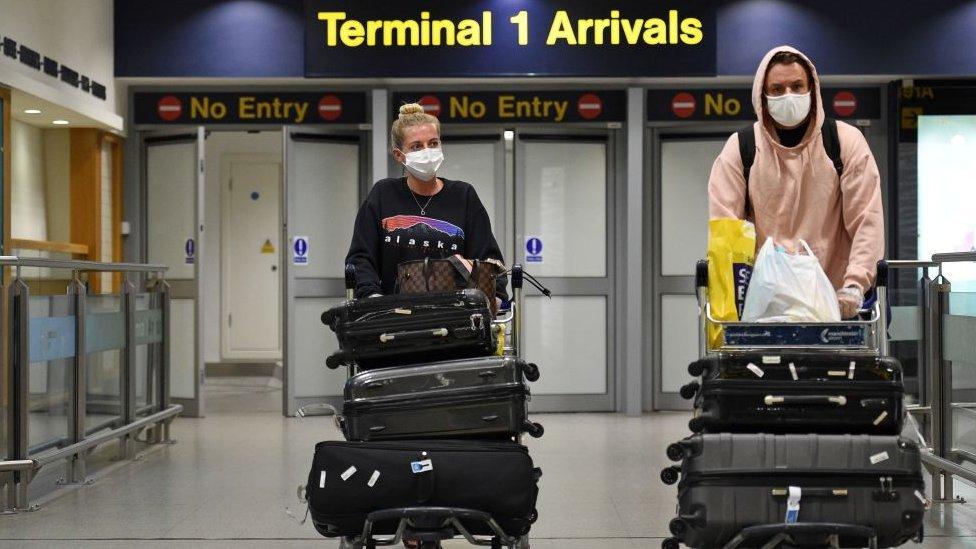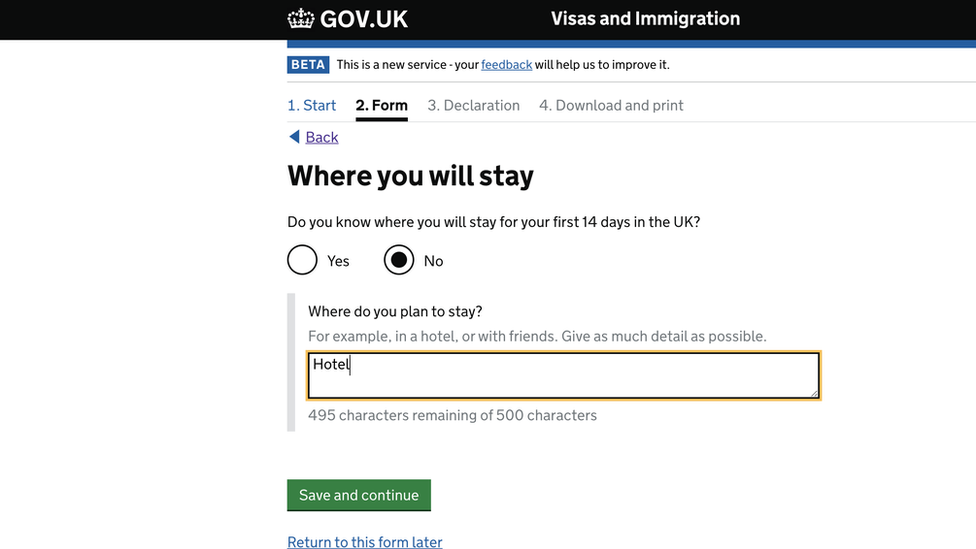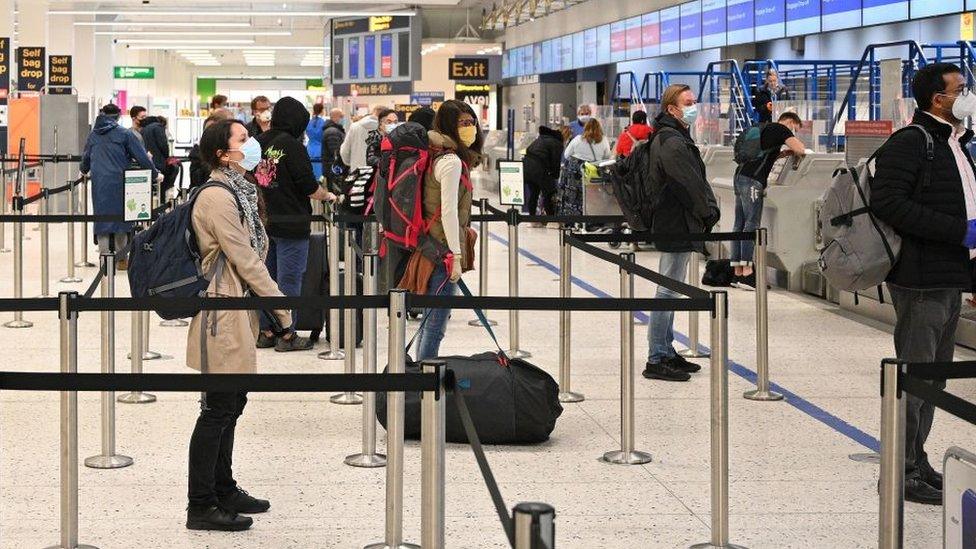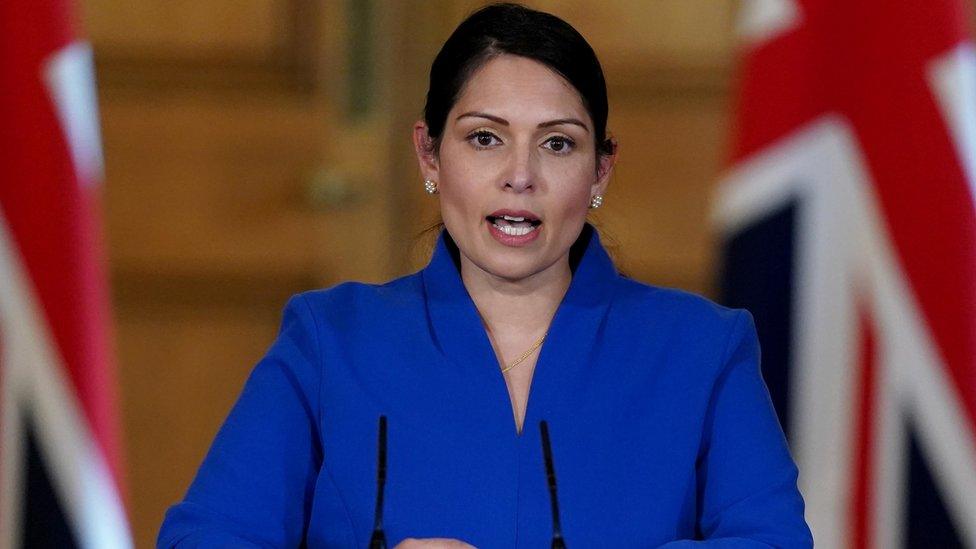Coronavirus: Five unanswered questions on the travel quarantine rules
- Published

Most people entering the UK from overseas are now expected to self-isolate for 14 days.
But there are still questions about how quarantine will be enforced and why it has been implemented now.
1. Why don't people have to say where they are staying?
Under the new rules, most travellers entering the UK by land, air or sea must complete an online form in the 48 hours before they arrive, stating where they will be staying in the UK while self-isolating and how they can be contacted.
They could be fined £100 for not filling in the form, while there is a fine of up to £1,000 in England for those who are found to be not complying with the self-isolation rules.
However, when filling in this "contact locator" form, travellers are given the option to not put down an address at all, or to put down more than one.

The quarantine form allows travellers to not disclose an address
The Home Office says that if someone arrives without a place to stay, then they will have to book accommodation at their own expense at a list of hotels provided, using its bookings system.
One reason people can put down more than one address is in case they need to stay in a hotel before moving on to their ultimate destination, or are legally obliged to change addresses, it adds, for example due to a court order.
2. Is the policy enforceable?
Guidance for border officials, seen by the BBC, indicates that unless the port of entry is particularly quiet, it is likely only "spot checks" will be used to see if passengers have filled out the forms.
The guidance states that border staff will generally have no way of checking whether addresses are real. They are advised to accept the information given unless other factors suggest there are "credibility concerns" - for example "stating that their name is Mickey Mouse or that their address is Buckingham Palace".

Public Health England (PHE) says it will contact 20% of those required to self-isolate via a phone call and text message.
If they have reason to suspect that somebody isn't complying, then their details can ultimately be passed to police who will enforce the measures as a last resort. However, the Home Office says police do not have a right to enter someone's home on the basis of this offence.
What's more, there are several reasons why someone is permitted to not be at an address, for example if they need to buy essential supplies and have no-one to do this for them.
3. Is it supported by science?
Home Secretary Priti Patel says the decision to bring in a travel quarantine system now is "guided by science", as UK transmission (or the spread of the virus) is low enough for imported cases to potentially cause a "devastating second wave".
Prof John Aston, the Home Office's chief scientific adviser, says the "scientific advice so far is clear" that the impact of the policy would have been "negligible" while transmission rates were higher.
"As the number of infections within the UK drops, we must now manage the risk of transmissions being reintroduced from elsewhere," he says.
However, some have questioned the decision to bring in quarantine measures now, when the UK has a higher transmission rate than many other countries.
Conservative MP Sir Liam Fox said in the House of Commons last week: ''If such a barrier was required, why was it not introduced earlier in the outbreak, and if it is a contingency measure against a so-called second wave, why apply it to countries with a lower infection rate than we already have?"

Home Secretary Priti Patel says the measures could help prevent a "devastating" second wave
Mark Woolhouse, professor of infectious disease epidemiology at the University of Edinburgh, suggests bringing in the policy "would have had some effect" during the "containment phase" of the virus response back in February. But he argues that bringing it in now "won't have any measurable impact on public health whatsoever".
In late February and early March, the government did advise passengers from affected areas, such as Wuhan in China and parts of Italy, to self-isolate when arriving in the UK, but this policy was dropped on 13 March.
Sir Patrick Vallance, the government's chief scientific adviser, said at the government's coronavirus press conference that "measures like this are most effective when the number of cases is very low, and applied to countries with higher rates".

THE R NUMBER: What it means and why it matters
LOOK-UP TOOL: How many cases in your area?
GLOBAL SPREAD: Tracking the pandemic
RECOVERY: How long does it take to get better?

4. Why does it vary from place to place?
There was some confusion over whether these travel quarantine rules would apply to the whole of the UK, because border security is a centralised measure, while health is devolved - meaning England, Scotland, Wales and Northern Ireland set their own rules.
Ultimately the measure was brought in as part of the Public Health Act, so when the UK government decided to introduce quarantine rules on 3 June they were for England only.
All home nations have now made it a requirement for travellers from abroad to quarantine for 14 days upon entering the UK. But they could choose to end the policy at different times, or to vary the rules. For example, workers providing essential healthcare will have to quarantine upon arrival in Scotland , externalbut not in England, Wales or Northern Ireland.
The level of fines issued for breaking the rules also vary. In Scotland, if someone fails to self-isolate for 14 days at a fixed address they will be fined £480, while in England, Wales and Northern Ireland it's £1,000.
In England, an individual will be fined £100 for not filling out the contact locator form correctly. In the rest of the UK the fine is £60, falling to £30 if paid promptly.
5. What about plans for 'air bridges'?
There has been a lot of discussion about so-called "air bridges", which could allow visitors from countries with low coronavirus transmission rates to enter the UK without having to self-isolate.
For an air bridge to open, two countries would have to agree to relax quarantine restrictions.
So far, Portugal is the only country offering to open an air bridge to the UK.
Sources close to the government have told the BBC that the Department for Transport is keen to open air bridges by the end of the month.
"Quash the quarantine", a lobbying group of more than 500 travel and hospitality companies, says it has been given "private assurances" from senior government sources that travel corridors - which encompass land, air and sea borders - will be in place by that time.
Additional reporting by Oliver Barnes and Nicholas Barrett.


